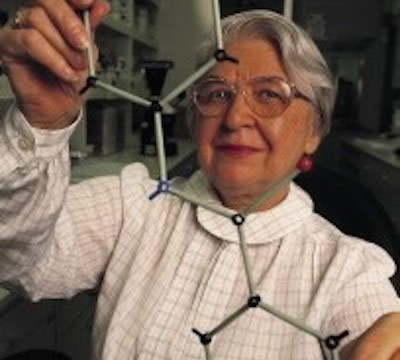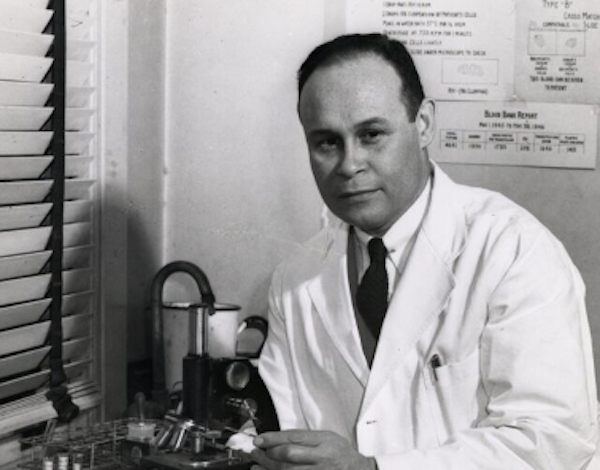
Highlights
Despite resistance in the lab to spinning such an unusual solution, Kwolek had the solution spun, and discovered Kevlar®.
Patents
- US 10,723,849: Method for fusing aramid/aramid fibers
- US 10,301,443: Composite materials with desired characteristics
- US 9,677,842: Protective glove for archery shooting
- US 8,906,653: Method for fermentatively producing 1,5-diaminopentane
- US 4,608,427: Method for making PBO and PBT polymers
- US RE30,352: Optically anisotropic aromatic polyamide dopes
- US 3,951,914: Process for preparing poly(1,4-benzamide) in cyclic sulfone media
- US 3,888,965: Method of increasing the initial modulus and reducing the orientation angle of undrawn poly (para-benzamide) fibers
- US 3,819,587: Wholly aromatic carbocyclic polycarbonamide fiber having orientation angle of less than about 45.degree.
- US 3,671,542: Optically anisotropic aromatic polyamide dopes
- US 3,380,969: Aromatic polyamides
- US 3,354,127: Aromatic copolyamides
- US 3,349,062: Halogenated aromatic polyamides
- US 3,328,352: Fluorine containing aromatic polycarbonamides
- US 3,322,728: Sulfonyl aromatic polyamides
- US 3,287,323: Process for the production of a highly orientable, crystallizable, filamentforming polyamide
- US 3,094,511: Wholly aromatic polyamides
- US 3,063,966: Process of making wholly aromatic polyamides
- US 3,006,899: Polyamides from reaction of aromatic diacid halide dissolved in cyclic nonaromatic oxygenated organic solvent and an aromatic diamine
In honor of Women’s History month, Carlson Caspers celebrates the achievements of inventor Stephanie Kwolek in the field of chemistry. Kwolek is best known for inventing Kevlar®, a synthetic fiber of exceptional strength and stiffness. She is credited as a named inventor on over 15 United States patents relating to her work as a chemist during her time at DuPont.
Kwolek was born in 1923 to Polish immigrants in a suburb of Pittsburgh, Pennsylvania. She earned her B.S. in chemistry from Carnegie Mellon University in 1946 and started at DuPont as a laboratory chemist where she stayed until retiring in 1986.
DuPont introduced nylon just before World War II and in the postwar years the company continued its focus on synthetic fibers. Kwolek specialized in developing low-temperature processes for identifying strong and rigid petroleum-based synthetic fibers and focused on aromatic polyamides, a type of polymer that can be made into strong, stiff, and flame-resistant fibers. In her effort to identify a next generation of fibers that could withstand extreme conditions, Kwolek prepared intermediates, synthesized aromatic polyamides of high molecular weight, dissolved the polyamides in solvents, and spun the resulting solutions into fibers.
In 1964, Kwolek’s group began a project targeting a lightweight yet strong fiber to replace the steel used in tires. While analyzing long molecule chains at low temperatures, Kwolek observed how polyamide molecules line up to form liquid crystalline polymer solutions of exceptional strength and stiffness. She discovered that under certain conditions, large numbers of polyamide molecules line up in parallel to form cloudy liquid crystalline solutions. This unusually fluid, turbid, and cloudy solution was unlike any polymer solution previously prepared. Despite resistance in the lab to spinning such an unusual solution, Kwolek had the solution spun, and it resulted in strong, stiff fibers. After this breakthrough, many fibers were spun from liquid crystalline solutions. In 1971, Kwolek’s invention led to DuPont introducing poly-p-phenylene terephthalamide under the trade name Kevlar ®. Kevlar® can be made into strong, tough, stiff, high-melting fibers that are five times stronger per weight than steel. Kevlar® is used in countless applications, including bullet proof vests, undersea fiber optics, bridge suspension ropes, high strength tirecord, and reinforced boat hulls, to name a few. Kwolek’s Kevlar® and the process for preparing it were patented, as were many other aromatic polyamides Kwolek and her team identified at DuPont.
Kwolek was honored with various awards throughout her career, including DuPont company’s Lavoisier Medal for outstanding technical achievement in 1995 for her discovery of Kevlar®. At the time of her death in 2014, she was the only female DuPont employee to have received the honor. Kwolek was awarded with the Chemical Pioneer Award from the American Institute of Chemists and an Award for Creative Invention from the American Chemical Society in 1980. In 1994, she was inducted into the National Inventors Hall of Fame, only the fourth woman member of 113 at that time. In 1996, she received the National Medal of Technology and the IRI Achievement Award. She received the Perkin Medal from the American Chemical Society in 1997 and was inducted into the National Women’s Hall of Fame in 2003.





